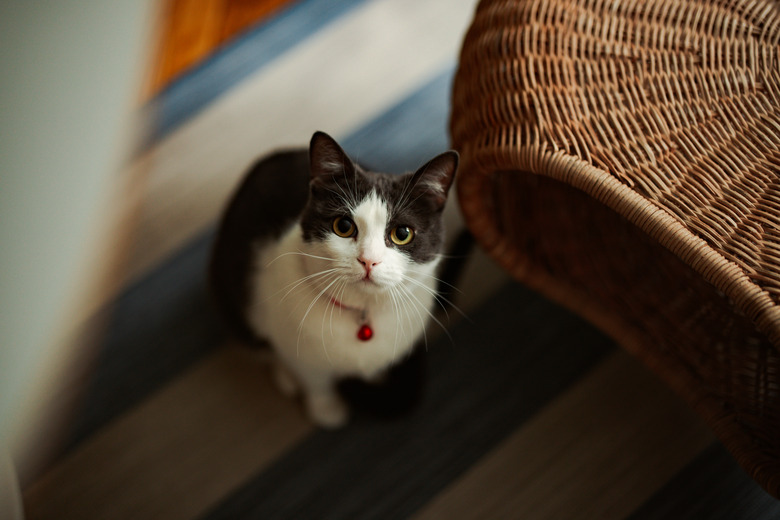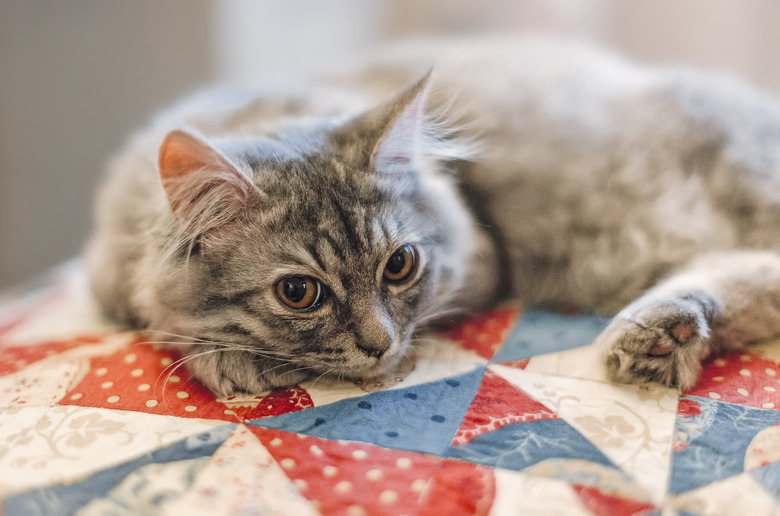Decompression Games For Cats Around July 4th
The fourth of July is a challenging time for cats. The holiday's fireworks mean loud and fightening sounds and lights — which can startle and upset our cats. The feelings of cats and kittens on July 4th are sometimes overlooked. When cats are scared, they are generally less loud and destructive compared to dogs. By having a safety plan, you can help your cat on July 4th. In addition to keeping your cat away from doors and having them wear updated identification tags, decompression games and activities are a great way to occupy and soothe your cat.
What Is a Decompression Game?
What Is a Decompression
Game?
Decompression activities are not about distracting your cat. They are about encouraging relaxation and soothing behaviors. Decompression activities are games and enrichment that tap into behaviors that are naturally calming for your cat. These games aren't about hyping your cat up through rigorous play. Decompression activities can be useful anytime your cat is experiencing or about to experience stress — and they can be be helpful during the July 4th holiday.
Use food and treat-dispensing cat toys
Use food and treat-dispensing cat toys
Mealtime is a favorite time of day for most cats. A way to incorporate decompression activities during this time, is to feed your cat dry food from food-dispensing toys. Instead of just using a bowl, (which might make them quickly lose interest) a treat and food dispensing ball or other toy releases bits of kibble when your cat bats and chases the toy around. This is a naturally rewarding and stress-reducing behavior for them, and a great activity to incorporate into your cat's regular routine. By turning their mealtime into a game, it can decrease their stress when the fireworks displays are happening.
Place treats in puzzles for cats
Place treats in puzzles for cats
Puzzles can be used at mealtime with your cat's kibble or used to provide treat snacks at other times of day. They can provide your cat with both physical and mental enrichment. With a puzzle, your cat will need to figure out the challenge of how to retrieve the treats from inside the puzzle. They will tap into your cat's natural instincts of using their paws to fish and bat at the puzzle pieces — to release their treats. There are plastic and wooden puzzles specifically designed for cats that you can purchase online or at local pet stores. You can also look at puzzles that are marketed for dogs, most are also appropriate for cats.
DIY cardboard box puzzles
DIY cardboard box puzzles
Another puzzle option is to make your own puzzles at home for your cat using empty cardboard boxes or paper bags. Take some clean and empty boxes or paper bags and then cut holes into the sides. Make sure your holes are different sizes for an added challenge. Then, put some treats inside the cardboard box or paper bag, close it up and give it to your cat. Many cats enjoy the opportunity to pounce, explore, and reach into the holes in the box or bag to retrieve the treats.
Lick mats as a soothing activity
Lick mats as a soothing activity
Licking is a soothing behavior for cats. If your cat eats wet food as part of their regular meals, (or as get it as a treat) lick mats are a great decompression activity to use for your cat's July 4th plans. Lick mats are plastic or silicone mats, which have a variety of different raised textured areas. You can spread your cat's wet food onto the mat before feeding them. The lick mat slows cats down while they eat and provides them with more engagement than just a plate of food. For many cats, this can be a great way to divert their attention away from the fireworks and refocus on naturally soothing activities.
Give your cat hiding spaces and shelter
Give your cat hiding spaces and shelter
Cats naturally like to seek out small, dark, and enclosed places where they feel safe. It's helpful to give your cat safe spaces and opportunities to seek shelter during and after the fireworks. Safe spaces can include, Cozy and enclosed cat beds, cat hiding houses, and other small or dark spaces. By giving your cat these designated safe spaces, you can also help prevent them from trying to seek shelter under furniture or other places where it will be more difficult to monitor how your cat is handling the fireworks. Your cat's hiding spot should be in a quiet area of the home. Consider playing music or turning on a white noise machine in your home to muffle the sound of the fireworks as well.
Give height access through cat trees or shelves
Give height access through cat trees or shelves
In addition to providing your cat with hiding spaces, many cats feel naturally soothed and comforted by being able to gain access to heights. From a higher vantage point, cats can observe what is going on around them. In advance of July 4th, consider adding cat trees, cat shelves and ledges onto your walls. These cat trees and shelves will give your cat an opportunity to safely climb, explore, and decompress in their own elevated space.
4th of July support
4th of July support
Decompression games are a way to provide enrichment and support to your anxious cat, but they are not a cure for feline anxiety. You can also incorporate over-the-counter supports like catnip (only if it chills your cat out and doesn't wind them up), pheromone diffusers, and other calming supports. If your cat continues to struggle with the sound of fireworks, it's a good idea to connect with your veterinarian. Your cat's vet will be able to help you assess your cat's anxiety and fear responses. Your vet may also prescribe an anti-anxiety medication to help your cat cope.
In summary
In summary
Decompression activities are a great way to help cats and kittens to form positive or neutral associations with fourth of July fireworks. Decompression games and activities can tap into your cat's natural instincts and can support your cat's abilities to self-soothe — despite the loud sounds of fireworks around them. Decompression activities are also helpful ways to provide your cat with access to safe spaces where they can escape and relax during stressful times.



